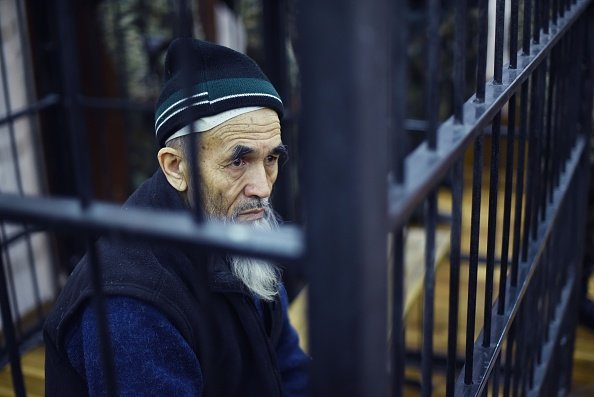PEN Centre Suisse Romand sends condolences for the death of Uzbek journalist and activist Azimjon Askarov
Azimjon Askarov / Image Credit: Anadolu.
Statement by the Committee for the Defence of Persecuted and Imprisoned Writers of Suisse Romand PEN Centre following the disappearance of Azimjon Askarov, Uzbek prisoner of human rights in Kyrgyzstan:
We are deeply affected by the death in prison of our brother writer Azimjon Askarov, we express our sincere condolences and affectionate thoughts to his wife Khadija Askarova, to his bereaved family and to his wounded friends and colleagues.
Azimjon Askarov received a life sentence in 2010: journalist and activist, he had his sentence upheld in August 2019
For memory, at Bishkek in Kyrgyzstan, the Assembly of Delegates of PEN International, meeting at the organization's 80th World Congress from 29 September to 2 October 2014, called for the immediate and unconditional release of three writers imprisoned in Central Asia.
In the great hall of the PEN International Congress, there were three empty chairs. The three prisoners did not come: Azimjon Askarov, Uzbek journalist and human rights defender in Kyrgyzstan, Vladimir Kozlov, writer and human rights defender in Kazakhstan and Ilham Tohti, writer and intellectual of the Uighur people, whose native land of Xinjiang is named the "Uighur Autonomous Region" under the rule of the Chinese Communist Party. Unforgettable moment of intense emotion: the President of the Committee for the Defence of Imprisoned Writers of PEN International Marian Botsford Fraser accompanies Khadija Askarova, the sweet and brave wife of prisoner Azimjon Askarov, to the podium; the two women introduced themselves to the delegates, including hundreds of writers, poets, journalists, publishers, translators, artists and intellectuals from around the world.
Azimjon Askarov was sentenced in 2010 to life imprisonment after a mock trial. Allegations of torture in detention according to the Human Rights Committee in a statement in 2016. Azimjon Askarov had been arbitrarily detained, imprisoned in inhumane conditions, mistreated and prevented from properly preparing his defence. Since then, the Kyrgyz authorities have refused to release Azimjon Askarov for medical and humanitarian reasons, despite his heart and respiratory problems and the risks posed by the Covid-19 pandemic.
On 17 May 2020, it was Azimjon Askarov's 69th birthday. The Suisse Romand PEN Centre renewed its Appeal to the authorities of Kyrgyzstan to release him immediately and unconditionally. We have failed in our duty to help Azimjon Askarov regain his freedom. And the Uzbek human rights defender to reunite with his family who suffered painfully from their long years of forced and unjust separation. In Geneva, Liz Throssel, spokesperson for the UN High Commissioner for Human Rights, said: « With regard to Azimjon Askarov, there should be a prompt, impartial and effective investigation into his death. Under international human rights law, his family has the right to redress».
The tragedies of broken pens, muffled voices, missing poets, murdered writers are repeated, all over the world. In memoriam. From Fédérico Garcia Lorca to Robert Desnos, from Hô Huu Tuong to Nguyên Manh Côn, from Ken Saro Wiwa to Anna Politkovskaya, from Hrant Dink to Guillermo Fernandez Garcia, from Vu Hoàng Chuong to Dinh Dang Dinh, from Vassyl Stous to Liu Xiaobo, from Shady Habash to Azimjon Askarov, among many other Sisters and Brothers Writers who died in prison. Dare we say: Death in indifference and with impunity, death deprived of liberty, thirsty for humanity and justice.
Arrested in January 2012, Azimjon Askarov was released on parole in August 2016, after serving four years in prison out of the seven-and-a-half-year sentence. On the other hand, despite the 2019 Sakarov Prize, the 2019 Vaclav Havel Prize, the 2017 Human Rights Prize of the City of Weimar, the 2016 Martin Ennals Prize and the 2014 PEN Barbara Goldsmith Prize for Freedom of Writing , Ilham Tohti, writer and intellectual of the Uighur people, continues to unjustly serve his inhuman prison sentence. Arrested in January 2014, after an unfair two-day trial in September 2014, Ilham Tohti was sentenced to life imprisonment. According to his daughter, Jewher Tohti, it was in 2017 that his family saw him for the last time in an internment camp in the Xinjiang region.
Nguyên Hoàng Bao Viêt, President of the Suisse Romand PEN Centre (delegate for the Committee for the Defence of Persecuted and Imprisoned Writers).
Version al español por Sara Tobal Galán

